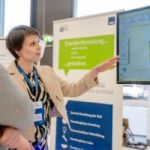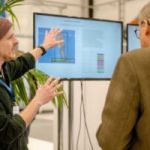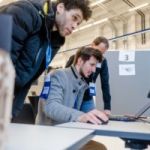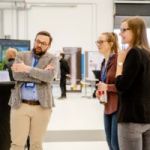Picture ©RUB, Marquard
On March 23, 2023, more than 100 guests accepted the invitation of the HUMAINE Competence Center to attend their public meta-milestone meeting in the form of a Spring Fair.
The human being at the center of work with artificial intelligence
The Metropole Ruhr regional competence center HUMAINE helps companies unleash the full potential of their AI solutions by establishing a human-centered process approach that ensures all relevant parties are involved in AI development, implementation and use. This reduces acceptance problems and sets the foundation for increasing profitability and better living and working conditions. The interdisciplinary team from various fields such as labor sciences, computer sciences or engineering sciences, together with the practical partners of the consortium, presented the project results of the last two years in the form of the HUMAINE spring fair in the new research building ZESS.
- Die Bilder dürfen nur im Kontext der Ruhr-Universität Bochum (RUB) unter Angabe des Copyrights © RUB, Marquard verwendet werden, zum Beispiel für Webseiten der RUB sowie für Texte oder Webseiten, die sich speziell mit Ereignissen an der RUB oder Leistungen von RUB-Mitgliedern beschäftigen. Die Bilder dürfen nicht in Kontexten verwendet werden, in denen die RUB nur stellvertretend für Hochschulen im Allgemeinen steht.
- Die Bilder dürfen nur im Kontext der Ruhr-Universität Bochum (RUB) unter Angabe des Copyrights © RUB, Marquard verwendet werden, zum Beispiel für Webseiten der RUB sowie für Texte oder Webseiten, die sich speziell mit Ereignissen an der RUB oder Leistungen von RUB-Mitgliedern beschäftigen. Die Bilder dürfen nicht in Kontexten verwendet werden, in denen die RUB nur stellvertretend für Hochschulen im Allgemeinen steht.
- Die Bilder dürfen nur im Kontext der Ruhr-Universität Bochum (RUB) unter Angabe des Copyrights © RUB, Marquard verwendet werden, zum Beispiel für Webseiten der RUB sowie für Texte oder Webseiten, die sich speziell mit Ereignissen an der RUB oder Leistungen von RUB-Mitgliedern beschäftigen. Die Bilder dürfen nicht in Kontexten verwendet werden, in denen die RUB nur stellvertretend für Hochschulen im Allgemeinen steht.
- Die Bilder dürfen nur im Kontext der Ruhr-Universität Bochum (RUB) unter Angabe des Copyrights © RUB, Marquard verwendet werden, zum Beispiel für Webseiten der RUB sowie für Texte oder Webseiten, die sich speziell mit Ereignissen an der RUB oder Leistungen von RUB-Mitgliedern beschäftigen. Die Bilder dürfen nicht in Kontexten verwendet werden, in denen die RUB nur stellvertretend für Hochschulen im Allgemeinen steht.
- Die Bilder dürfen nur im Kontext der Ruhr-Universität Bochum (RUB) unter Angabe des Copyrights © RUB, Marquard verwendet werden, zum Beispiel für Webseiten der RUB sowie für Texte oder Webseiten, die sich speziell mit Ereignissen an der RUB oder Leistungen von RUB-Mitgliedern beschäftigen. Die Bilder dürfen nicht in Kontexten verwendet werden, in denen die RUB nur stellvertretend für Hochschulen im Allgemeinen steht.
- Die Bilder dürfen nur im Kontext der Ruhr-Universität Bochum (RUB) unter Angabe des Copyrights © RUB, Marquard verwendet werden, zum Beispiel für Webseiten der RUB sowie für Texte oder Webseiten, die sich speziell mit Ereignissen an der RUB oder Leistungen von RUB-Mitgliedern beschäftigen. Die Bilder dürfen nicht in Kontexten verwendet werden, in denen die RUB nur stellvertretend für Hochschulen im Allgemeinen steht.
- Die Bilder dürfen nur im Kontext der Ruhr-Universität Bochum (RUB) unter Angabe des Copyrights © RUB, Marquard verwendet werden, zum Beispiel für Webseiten der RUB sowie für Texte oder Webseiten, die sich speziell mit Ereignissen an der RUB oder Leistungen von RUB-Mitgliedern beschäftigen. Die Bilder dürfen nicht in Kontexten verwendet werden, in denen die RUB nur stellvertretend für Hochschulen im Allgemeinen steht.
- Die Bilder dürfen nur im Kontext der Ruhr-Universität Bochum (RUB) unter Angabe des Copyrights © RUB, Marquard verwendet werden, zum Beispiel für Webseiten der RUB sowie für Texte oder Webseiten, die sich speziell mit Ereignissen an der RUB oder Leistungen von RUB-Mitgliedern beschäftigen. Die Bilder dürfen nicht in Kontexten verwendet werden, in denen die RUB nur stellvertretend für Hochschulen im Allgemeinen steht.
- Die Bilder dürfen nur im Kontext der Ruhr-Universität Bochum (RUB) unter Angabe des Copyrights © RUB, Marquard verwendet werden, zum Beispiel für Webseiten der RUB sowie für Texte oder Webseiten, die sich speziell mit Ereignissen an der RUB oder Leistungen von RUB-Mitgliedern beschäftigen. Die Bilder dürfen nicht in Kontexten verwendet werden, in denen die RUB nur stellvertretend für Hochschulen im Allgemeinen steht.
Picture ©RUB, Marquard
HUMAINE is supported by research and politics
Motivating words came via video message from Parliamentary State Secretary Mario Brandenburg. He emphasized the relevance of human-centeredness for AI applications in a digitalized society. The Rectorate of Ruhr-Universität Bochum, represented by Professor Günther Meschke (Prorector for Research and Transfer), presented the role of the HUMAINE Competence Center as a puzzle piece of the RUB’s transfer strategy on the Mark 51°7 science campus. Afterwards, the project leader Professor Uta Wilkens (Institute of Work Science) opened the decentralized part of the event. In her address, she too recalled the recent positioning of the German Ethics Council on the role of humans at work with artificial intelligence, which coincides with the goals of the Competence Center.
The exhibits showed the broad spectrum of methods and applications from the fields of industry and health care management.
With 20 exhibits to look at and experience for themselves, the more than 30 players in the project consortium presented the project results to date to an interested audience. In addition to demonstrators for speech recognition and therapy support in speech therapy, defacing of MRI data or image recognition in quality assurance, visitors were able to try out for themselves the first prototype of a simulation lab for role development when working with AI. The concept for permanent collaboration beyond the funded project period was also presented and discussed. In addition, the practice partners from the pilot applications took the opportunity to show the progress and results of their applications and experiences with AI. This created many opportunities for intensive exchange between partners and interested parties from research and practice.








